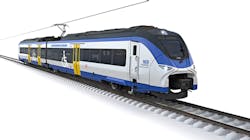Siemens Mobility delivering 31 Battery Powered Trains for Brandenburg Rail Network
German railway firm Niederbarnimer Eisenbahn has ordered 31 battery-operated trains to run on all lines of the East Brandenburg network.
At present, diesel-powered trains operate on the network’s routes. By switching to the Mireo Plus B battery-powered trains, annual consumption of diesel fuel will be reduced by around 4.4 million liters in the East Brandenburg network, while emissions could be cut by 11,500 metric tons per year.
The order from Siemens Mobility will launch service in December 2024.
The battery-hybrid train draws its energy from the overhead contact line. On non-electrified sections of the network’s routes, lithium-ion batteries – previously charged on the electrified sections – provide the train’s power supply. Recovered braking energy is also used for powering the train. The two-car train has a battery-electric range of more than 90 kilometers.
“The use of environmentally friendly propulsion systems in public transport marks a milestone in the technical transition taking place in the rail sector,” Guido Beermann, Minister for Transport for the State of Brandenburg, said in a statement. “As the first battery-electric, multiple-unit train in the VBB network, the Mireo Plus B provides real added value in terms of climate compatibility and economy compared to the trains operating with combustion engines currently in use.
The new train cars are equipped with three doors on each side, enabling passengers in wheelchairs or with buggies to board and exit easier, even on lower platforms. Three doors on each car side as well as new navigation system in the train ensure that passenger interchanges at stations are fast, uncomplicated and, above all, barrier-free.
With the new trains, passengers on the network’s lines will have available at least 128 seats and twelve spaces for bicycles, wheelchairs, and buggies. Two or more trainsets can be coupled and operated as so-called double or multiple units to provide additional seating capacity.
The order will also include a service and spare parts supply contract over twelve years until 2036. Siemens Mobility will ensure the availability of the trains over the entire term of the contract.
About the Author
EnergyTech Staff
Rod Walton is head of content for EnergyTech.com. He has spent 17 years covering the energy industry as a newspaper and trade journalist.
Walton formerly was energy writer and business editor at the Tulsa World. Later, he spent six years covering the electricity power sector for Pennwell and Clarion Events. He joined Endeavor and EnergyTech in November 2021.
He can be reached at [email protected].
EnergyTech is focused on the mission critical and large-scale energy users and their sustainability and resiliency goals. These include the commercial and industrial sectors, as well as the military, universities, data centers and microgrids.
Many large-scale energy users such as Fortune 500 companies, and mission-critical users such as military bases, universities, healthcare facilities, public safety and data centers, shifting their energy priorities to reach net-zero carbon goals within the coming decades. These include plans for renewable energy power purchase agreements, but also on-site resiliency projects such as microgrids, combined heat and power, rooftop solar, energy storage, digitalization and building efficiency upgrades.
